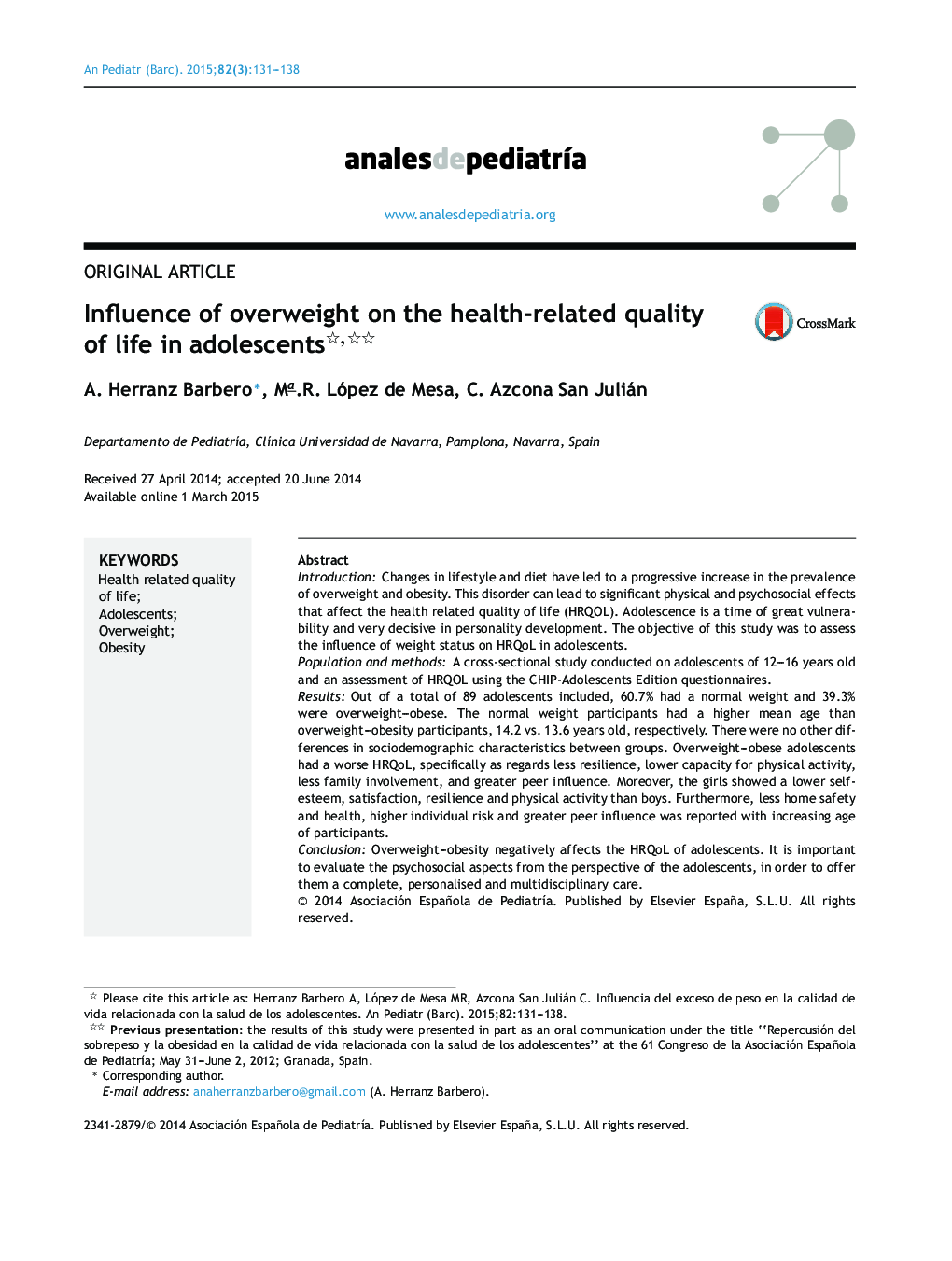| کد مقاله | کد نشریه | سال انتشار | مقاله انگلیسی | نسخه تمام متن |
|---|---|---|---|---|
| 4145181 | 1272592 | 2015 | 8 صفحه PDF | دانلود رایگان |
IntroductionChanges in lifestyle and diet have led to a progressive increase in the prevalence of overweight and obesity. This disorder can lead to significant physical and psychosocial effects that affect the health related quality of life (HRQOL). Adolescence is a time of great vulnerability and very decisive in personality development. The objective of this study was to assess the influence of weight status on HRQoL in adolescents.Population and methodsA cross-sectional study conducted on adolescents of 12–16 years old and an assessment of HRQOL using the CHIP-Adolescents Edition questionnaires.ResultsOut of a total of 89 adolescents included, 60.7% had a normal weight and 39.3% were overweight–obese. The normal weight participants had a higher mean age than overweight–obesity participants, 14.2 vs. 13.6 years old, respectively. There were no other differences in sociodemographic characteristics between groups. Overweight–obese adolescents had a worse HRQoL, specifically as regards less resilience, lower capacity for physical activity, less family involvement, and greater peer influence. Moreover, the girls showed a lower self-esteem, satisfaction, resilience and physical activity than boys. Furthermore, less home safety and health, higher individual risk and greater peer influence was reported with increasing age of participants.ConclusionOverweight–obesity negatively affects the HRQoL of adolescents. It is important to evaluate the psychosocial aspects from the perspective of the adolescents, in order to offer them a complete, personalised and multidisciplinary care.
ResumenIntroducciónLos cambios en el estilo de vida y la alimentación han conllevado un aumento progresivo de la prevalencia del sobrepeso-obesidad. Esta enfermedad puede conllevar importantes repercusiones físicas y psicosociales que deterioran la calidad de vida relacionada con la salud (CVRS). La adolescencia es una etapa de gran vulnerabilidad por el entorno y muy determinante en el desarrollo de la personalidad del individuo. El objetivo fue evaluar la influencia del estado ponderal en la CVRS de los adolescentes.Población y métodosEstudio transversal de adolescentes de 12 a 16 años. Evaluación de la CVRS mediante los cuestionarios CHIP-Adolescent Edition.ResultadosOchenta y nueve adolescentes, 60,7%, eran normoponderales y el 39,3% tenía sobrepeso-obesidad. Los participantes normoponderales tenían una edad media superior a los participantes con sobrepeso-obesidad, 14,2 frente a 13,6 años, respectivamente. No había otras diferencias entre las características sociodemográficas de ambos grupos. Los adolescentes con sobrepeso-obesidad reflejaron peor CVRS, concretamente refirieron menor resistencia, menor capacidad de actividad física, menor participación familiar y mayor influencia de sus iguales. Asimismo, las chicas reflejaron menor autoestima, satisfacción, resistencia y capacidad de actividad física que los chicos. Por otro lado, a medida que aumentaba la edad de los participantes, referían menor salud y seguridad en el hogar, mayor riesgo individual y mayor influencia de sus iguales.ConclusiónEl sobrepeso-obesidad repercute negativamente en la CVRS de los adolescentes. Consideramos importante evaluar los aspectos psicosociales desde la perspectiva del paciente para poder ofrecerle una atención personalizada y multidisciplinar.
Journal: Anales de Pediatría (English Edition) - Volume 82, Issue 3, March 2015, Pages 131–138
